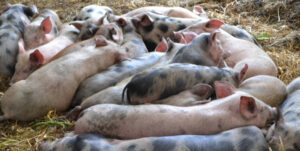
Animals bred for meat now consume a third of all vegetable crops. This has increased dramatically since a ban on pigswill following the Foot and Mouth outbreak in the UK. But it is an appalling waste. Japan can show the way to feeding pigs our waste food which is safe, argues the Green MEP MOLLY SCOTT CATO
Politics of pigswill
The ban has made farmers increasingly dependent on feed made from crops such as maize, wheat and soy. The amount of crop-based feed being fed to pigs has sky-rocketed, and an astounding 36 percent of world crops go for animal feed.
Not only are these crops notorious for their greenhouse emissions – as they are driving deforestation – but they are more expensive too. The transition from food waste for feed to crop-based feed has led to a 56 percent to 69 percent rise in production costs across the EU.
In 2002, the European Parliament set up an inquiry committee to investigate the UK’s response to FMD, and specifically its decision to slaughter around 6.5 million animals rather than implement an emergency vaccination programme.
What may have been forgotten, is that the British government quickly reversed its decision to vaccinate all animals at risk of contracting FMD in the UK, after heavy lobbying from the NFU and corporate giants in the food industry, such as Nestle.

This was due to concerns raised by industry and from farmers that a vaccination programme would hurt their meat and dairy exports. In other words, although it was poorly treated food waste that sparked the FMD outbreak, vaccination could have limited its spread.
Freshness ensured
The politics of pigswill may be about to get more interesting than you could ever have imagined. Michael Gove, the environment secretary, may be about to shift position on pigswill. It may become the next front in his war to look greener than the Commission, following up on the #EUDoesntSuck fracas over the banning of plastic straws.
The campaign group Feedback has long been calling for policy change to see safely treated food waste integrated back into the feed industry.
The campaign group Feedback has long been calling for policy change to see safely treated food waste integrated back into the feed industry. This has already been safely implemented in the United States and Japan, and costs saved on feed are often used to improve welfare conditions on many farms.
Not convinced? The case being made in the EU is compelling, too.
In Japan, any by-products and former foodstuffs containing animal origin protein must undergo heat treatment of at least 30 minutes at 70 °C or for 3 minutes or more at 80 °C.

This level of heat kills the pathogenic micro-organisms which cause disease. There are also heavy controls on the supply, storage, transportation and labelling of food waste for animal feed, insuring that the risk of cross-contamination is limited and freshness ensured.
Having your cake
The Japanese model was reviewed by a team of top veterinary epidemiologists, microbiologists, pig nutrionists and an APHA animal by-product advisor.



